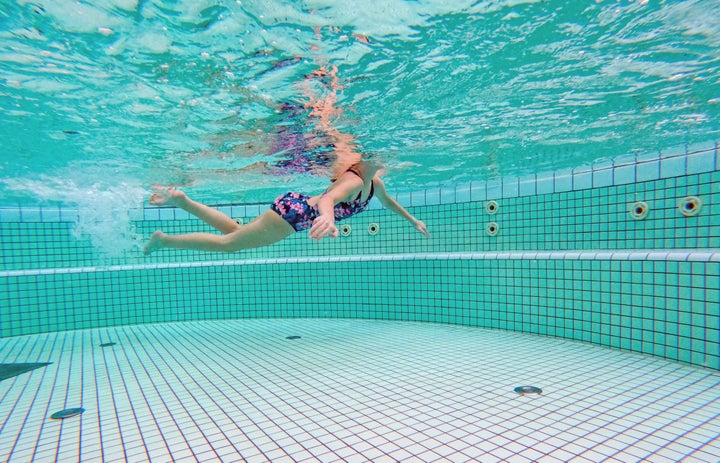🔴 Website 👉 https://u-s-news.com/
Telegram 👉 https://t.me/usnewscom_channel
You know you shouldn’t pee in the pool, but you probably do it anyway. But at what cost? Do you even know?
There are no hard-and-fast numbers on how often people pee in the pool, but at least one survey got 40% of American adults to admit to peeing in the pool. It doesn’t seem like they’re exaggerating: Older research published in the journal Environmental Science & Technology Letters analyzed water samples from 31 pools and hot tubs and discovered that a 220,000-gallon pool contained about 20 gallons of pee.
With that, the odds of you swimming in pee this summer are high. While peeing in the pool is gross, is it really all that bad? What can happen if you or someone around you does this just once? In the name of science, we tapped a toxicologist, infectious disease physician and microbiologist to break it all down.
What happens when you pee in a pool?
A few things. The big issue is the interaction of urine with the chemicals in the pool. “When human urine combines with chemicals that are present in chlorinated swimming pools, potentially harmful compounds called disinfection byproducts, or DBPs, can form,” said Dr. Kelly Johnson-Arbor, a toxicologist at MedStar Health.
Stefan Cristian Cioata via Getty Images
Urine naturally contains nitrogen-containing compounds like urea, ammonia and creatinine, Johnson-Arbor explained. “These nitrogen-rich compounds can react with chlorine or other disinfectants found in swimming pools to form DBPs that can cause harmful health effects.”
Chlorine specifically forms something called chloramines when it binds to human waste products (like pee) in the pool, according to the Centers for Disease Control and Prevention. These chloramines can build up in the water and off-gas into the air.
This isn’t just a urine thing. “Chlorine interacts with many kinds of organic matter,” said Thomas Melendy, associate professor of microbiology and immunology, and biochemistry in the Jacobs School of Medicine and Biomedical Sciences at the University at Buffalo in New York. “The reason it’s put in pools is to act as an antibacterial and antiviral. It helps to keep the pool clean and noninfectious.”
How big of a deal is it?
It depends on how you look at it. “From an infectious disease point of view, peeing in a well-chlorinated pool doesn’t really present a problem. That’s not to be confused with pooping in the pool, which does,” said Dr. Thomas Russo, professor and chief of infectious disease at the University at Buffalo. While urine isn’t sterile, most people don’t carry major pathogens in their pee that chlorine can’t handle, Russo said.
But chloramines can be an issue, according to Melendy. “Any time chlorine interacts with organic matter, it makes chloramines,” he said. “The more chloramines that are produced, the higher the risk of skin, eye and lung irritation.” (This can be a bigger problem in people with underlying respiratory issues such as asthma, he said.)
If ventilation in an area isn’t great, chloramines that off-gas from the water will settle on the water’s surface, where they can cause symptoms, according to the CDC. One of those chloramines is trichloramine, a volatile chemical that evaporates easily into the air and causes that signature “chlorine” smell in swimming pools, Johnson-Arbor said.
The more organic matter in the pool, the more chloramines are produced, Melendy said. (That includes pee, along with sweat and poop particles.) This also inactivates the chlorine, he points out. “The more organic matter you introduce to the pool, the less effective chlorine is at being an antibacterial because it gets used up,” Melendy said.
What if you pee in a saltwater pool?
The impact is likely the same, Johnson-Arbor said. “Saltwater pools use electrochemically generated chlorine instead of liquid chlorine for disinfection,” Johnson-Arbor said. (Electrochemically generated chlorine happens after an electric current is passed through a concentrated salt solution.)
“Since this process still generates chlorine, any nitrogen-containing matter that is present in a saltwater pool can still combine with the chlorine to generate DBPs,” Johnson-Arbor said.
What if only one person pees in the pool?
If you really have to go and there’s no bathroom nearby, it’s fair to wonder how much of an issue it will be if just one person pees in the pool. “It’s a matter of concentration,” Melendy said. “There’s so much chlorine and water in the pool. If just one person pees in a very large pool, it’s unlikely to create a significant irritant.” (However, he points out that sensitivity varies from person to person.)
“If it’s one person in a really small pool, it might have a significant impact,” Melendy said. “Conversely, if it’s a big pool and a lot of people are doing it, it’s going to produce lots of chloramine gases. This is a nuanced thing.”
Johnson-Arbor also pointed out that this isn’t just a urine issue. Sweat and poop particles inevitably slip off your skin and into the water, too. “In addition, if individuals do not shower before entering pools, their loose hairs and skin cells can transfer from their bodies into the pool, further contributing to development of DBPs,” Johnson-Arbor said.
Ultimately, doctors recommend taking a pass on peeing in the pool. “Public health perspective aside, it’s just bad behavior,” Russo said.

